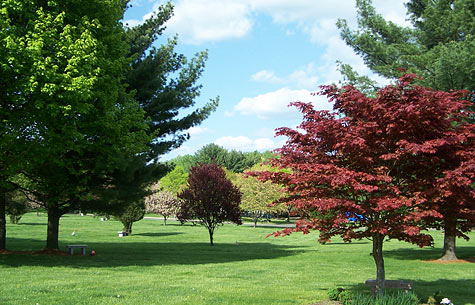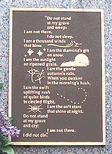
Frequently-Asked Questions, and Glossary

By an unknown author; the words emblazoned here echo timeless Jewish sentiment.
When should the burial occur?
Jewish law requires that a burial take place within twenty-four hours
after the death occurs whenever possible. Where the funeral service
would otherwise have to be held late on Friday, it is permissable to
postpone it until Sunday (Funerals are prohibited on the Sabbath.)
Why does a casket have to be made of wood?
Metal caskets would retard the natural processes and this would not be keeping with Halacha (Jewish law). Liners
are required to protect the surface of the cemetery. The liner must
have holes in the bottom and earth placed in the bottom of the liner as
an alternative method to comply with Halacha.
Funerals during Holidays?
Funerals cannot be held on the Sabbath, Rosh Hashannah, Yom Kippur, or
on the first and last days of the festivals: Pesach, Sukkot, Shavuot.
The Kaddish prayer: is
said at services for a full year. The Kaddish is not a prayer for the
dead, but it is an affirmation of our faith in G-d. Its consolation
comes from the mourner's recitation of this faith at a time, unless the
effort is made, one could lose his faith in G-d and life.
K'rai: This rite consists
of tearing a visible portion of a piece of the mourners clothing (on
the left side of a lapel, pocket, collar) worn at the cemetery and
throughout the shiva period except on the Sabbath. Some families use
what has become an American custom and what funeral directors call a K'rai ribbon, the ribbon is cut instead of a piece of the mourners clothing - however that is not according to Halacha.
K'vurah: shoveling of
earth onto the casket. By using the back of the shovel you are showing
your reluctence and the hurt you feel by having to bury a loved one.
Covering the casket is considered a mitzvah (honor) as it is something
you can do for the deceased that cannot be reciprocated. One (of the
many) Rabbinical interpetations of K'vurah suggests that by completing
the burial you are a part of the closure that allows the soul to be
released. After leaving the cemetery it is customary for friends to
provide the first meal. A hard-boiled egg is included in the meal to
symbolize the continuity of life. Many friends and family when making a
shiva call bring meals of consolation.
Shomir: Traditionally it
is required that someone stand watch over the body until burial. This
service is obtained through the funeral director. It is not obligatory
or required in Reform practice.
Shroud: Jewish tradition calls for having the body buried in a simple white garment called a Shroud. Reform Rabbi's allow the deceased to be buried in his or hers own clothes.
Passing the Synagogue: Traditionally, the funeral procession would wind past the synagogue where the deceased had been active, however, due to present day traffic issues, this custom is infrequently practiced.
Pallbearers: Tradition has it that no children of the deceased can be pallbearers, and nowadays, members of the immediate family do not act as pallbearers. Traditionally, Judaism required Pallbearers be Jewish, friends and family.
Non-Jews may share in Eulogies.
Sheloshim (thirty): Mourning period ends on the morning of the thirthieth day after the funeral. However, for the death of a parent, the traditional mourning continues for one year. The kaddish is recited for eleven months after the death according to the Hebrew Calendar. Suggested reading, Saying Kaddish by Anita Diamant.
Taharah: The ritual cleansing of the body that is required by Halacha.
Tzedakah: Friends and associates of the deceased who wish to show expression of condolence can contribute to a charity which was important to the deceased. Flowers are not appropriate at a Jewish burial. (They can be placed at the grave site afterward)
Shroud: Jewish tradition calls for having the body buried in a simple white garment called a Shroud. Reform Rabbi's allow the deceased to be buried in his or hers own clothes.
Passing the Synagogue: Traditionally, the funeral procession would wind past the synagogue where the deceased had been active, however, due to present day traffic issues, this custom is infrequently practiced.
Pallbearers: Tradition has it that no children of the deceased can be pallbearers, and nowadays, members of the immediate family do not act as pallbearers. Traditionally, Judaism required Pallbearers be Jewish, friends and family.
Non-Jews may share in Eulogies.
Sheloshim (thirty): Mourning period ends on the morning of the thirthieth day after the funeral. However, for the death of a parent, the traditional mourning continues for one year. The kaddish is recited for eleven months after the death according to the Hebrew Calendar. Suggested reading, Saying Kaddish by Anita Diamant.
Taharah: The ritual cleansing of the body that is required by Halacha.
Tzedakah: Friends and associates of the deceased who wish to show expression of condolence can contribute to a charity which was important to the deceased. Flowers are not appropriate at a Jewish burial. (They can be placed at the grave site afterward)
Who may Conduct the Funeral Service? An ordained Rabbi usually conducts the services, however, any informed Jew is permitted to do the service.
Visitation: Traditionally, there are no visits to the cemetery the first 30 days following the burial. One can visit at all other times, except on Sabbaths and High Holidays.
Visitation: Traditionally, there are no visits to the cemetery the first 30 days following the burial. One can visit at all other times, except on Sabbaths and High Holidays.
TOP | home | hints | news | cost | faq | tradition | Maintenance | plan | tour | directions | hours |
Regulations |
Contact |
Admin
X
JUMP TO:
Minimal Delay
Wooden Casket
Holidays, the Kaddish
Shomir, Shroud
Pass the Synagogue, Visitation
Contact
Hours of Operation
Directions
TEL: 301-384-1000
BACK TO TOP
Minimal Delay
Wooden Casket
Holidays, the Kaddish
Shomir, Shroud
Pass the Synagogue, Visitation
Contact
Hours of Operation
Directions
TEL: 301-384-1000
BACK TO TOP